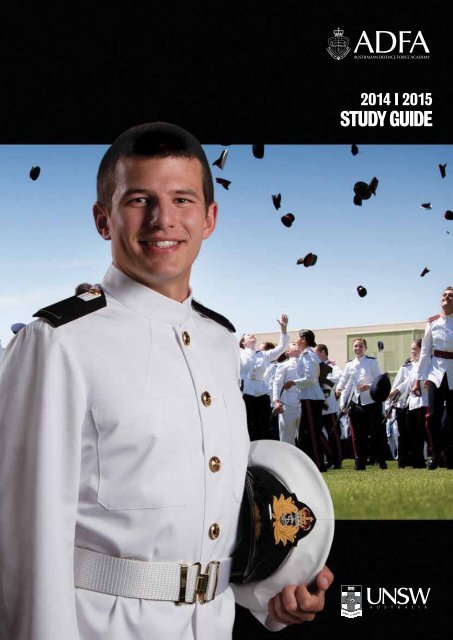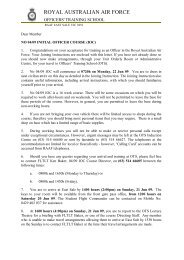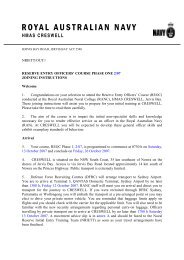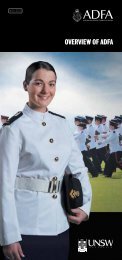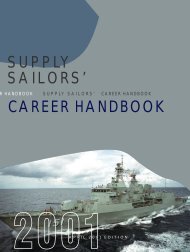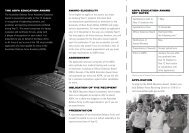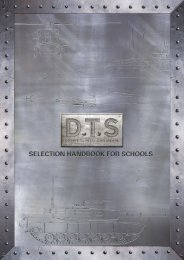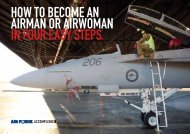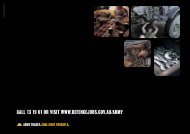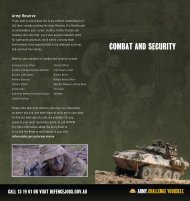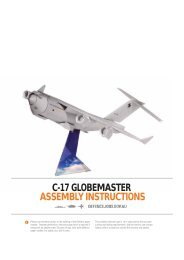Study at ADFA 2014-2015 - Australian Defence Force Recruiting
Study at ADFA 2014-2015 - Australian Defence Force Recruiting
Study at ADFA 2014-2015 - Australian Defence Force Recruiting
You also want an ePaper? Increase the reach of your titles
YUMPU automatically turns print PDFs into web optimized ePapers that Google loves.
<strong>2014</strong> I <strong>2015</strong><br />
STUDY Guide
THE australian defence force academy<br />
The <strong>Australian</strong> <strong>Defence</strong> <strong>Force</strong> Academy (<strong>ADFA</strong>)<br />
provides training and educ<strong>at</strong>ion for the future<br />
leaders of the Navy, Army and Air <strong>Force</strong>. Combining<br />
military and leadership training with study for an<br />
undergradu<strong>at</strong>e degree from the University of New<br />
South Wales (UNSW), you will gain the skills you<br />
need to enter the most exciting career of your life<br />
whether you join the Navy, Army or Air <strong>Force</strong>.<br />
<strong>ADFA</strong> is one of the world’s best military academies<br />
and provides a gre<strong>at</strong> training environment for junior<br />
military leaders.<br />
If you are accepted to join <strong>ADFA</strong>, you will receive<br />
a fully funded world-class educ<strong>at</strong>ion from UNSW<br />
and, upon successful gradu<strong>at</strong>ion, a guaranteed<br />
career in the <strong>Australian</strong> <strong>Defence</strong> <strong>Force</strong> (ADF).<br />
There are differences between <strong>ADFA</strong> and other<br />
military training institutions, but you are about<br />
to discover all the benefits of a unique military<br />
academy coupled with a world renowned university.<br />
In this brochure you will also discover wh<strong>at</strong> it’s like<br />
to train and study <strong>at</strong> <strong>ADFA</strong>, the degrees on offer,<br />
the lifestyle, and the opportunities you will receive.<br />
A world-class university<br />
UNSW is one of Australia’s most respected<br />
universities, with an intern<strong>at</strong>ional reput<strong>at</strong>ion<br />
for outstanding academic programs and<br />
world-class research. UNSW is one of the<br />
‘Group of Eight’ leading universities in Australia.<br />
UNSW Canberra <strong>at</strong> <strong>ADFA</strong> offers the best<br />
student-to-teacher r<strong>at</strong>io in the country and some<br />
of the best academic staff in their respective<br />
fields. So you can be sure th<strong>at</strong> the degree you<br />
study for will be of the highest standing.<br />
The benefits of <strong>ADFA</strong><br />
You are a member of the ADF and paid to study.<br />
All of your tuition fees and most of your textbooks<br />
will be paid for, and you will receive subsidised<br />
accommod<strong>at</strong>ion, plus free medical and dental care.<br />
You certainly won’t find th<strong>at</strong> <strong>at</strong> other universities.<br />
You will live and study on campus in Canberra,<br />
have access to the l<strong>at</strong>est technology and facilities<br />
and enjoy 23 hectares of sporting fields.<br />
To gradu<strong>at</strong>e from <strong>ADFA</strong> you must successfully<br />
complete both military and academic<br />
requirements. When you gradu<strong>at</strong>e, you will<br />
receive a UNSW degree just as though you<br />
were studying <strong>at</strong> the Sydney campus. But best<br />
of all, you are guaranteed a job as an officer<br />
in the ADF if you gradu<strong>at</strong>e successfully.<br />
UNSW Canberra also offers opportunities for<br />
study and research <strong>at</strong> postgradu<strong>at</strong>e levels leading<br />
to Gradu<strong>at</strong>e Diplomas as well as Masters and<br />
Doctoral degrees. Sponsorship of postgradu<strong>at</strong>e<br />
studies is <strong>at</strong> the discretion of the individual Services.<br />
1
wh<strong>at</strong> kind of<br />
people join adfa<br />
Uncommon backgrounds, one common goal.<br />
You’ll find your classm<strong>at</strong>es are from all over Australia and the world,<br />
and from many different backgrounds. Yet everyone shares common<br />
<strong>at</strong>tributes. The willingness to work hard, enjoy a challenge, adapt<br />
to new situ<strong>at</strong>ions, be a team player and work with others to make<br />
things happen. And while military training and academic pursuits<br />
are the focus of life <strong>at</strong> <strong>ADFA</strong>, there’s always time for fun<br />
with the new friends you will make during your time here.<br />
2
wh<strong>at</strong> degrees<br />
can you study<br />
The following Bachelor degrees are available from UNSW Canberra:<br />
Bachelor of Arts<br />
BA, BA (CDF) and BA (Hons)<br />
Bachelor of Business<br />
BBus, BBus (CDF) and BBus (Hons)<br />
Bachelor of Engineering<br />
BEng (Aeronautical, Civil, Electrical and Mechanical)<br />
BEng (Aeronautical, Civil, Electrical and Mechanical) (CDF)<br />
Bachelor of Inform<strong>at</strong>ion Technology BIT, BIT (CDF) and BIT (Hons)<br />
Bachelor of Science<br />
BSc, BSc (CDF) and BSc (Hons)<br />
Bachelor of Technology BTech (Aeronautical and Avi<strong>at</strong>ion)<br />
BTech (Aeronautical) (CDF)<br />
The Honours year is subject to the requirements of the individual Services.<br />
For more inform<strong>at</strong>ion on degrees available, see pages 6 to 15 of this brochure<br />
or visit unsw.adfa.edu.au<br />
3
a unique partnership<br />
Wh<strong>at</strong> makes <strong>ADFA</strong> different<br />
<strong>ADFA</strong> provides a unique partnership between the<br />
Department of <strong>Defence</strong> and the University of<br />
New South Wales. <strong>ADFA</strong> enables midshipmen (an<br />
officer in the Navy) and officer cadets (Army and<br />
Air <strong>Force</strong>) to undertake cutting edge military and<br />
leadership training whilst studying <strong>at</strong> one of the<br />
world’s leading universities. The educ<strong>at</strong>ion and<br />
skills you will gain from your time <strong>at</strong> <strong>ADFA</strong> will set<br />
you up to face any challenge and perform on<br />
the world stage as a military leader.<br />
As a gradu<strong>at</strong>e of <strong>ADFA</strong> you are on the p<strong>at</strong>h<br />
to life-long learning. As an officer in the<br />
<strong>Australian</strong> <strong>Defence</strong> <strong>Force</strong> you will undertake<br />
specialist <strong>Defence</strong> training designed to keep<br />
you <strong>at</strong> the forefront of your profession, and<br />
you will be encouraged to undertake further<br />
university educ<strong>at</strong>ion.<br />
Wh<strong>at</strong>ever way you look <strong>at</strong> it, starting your<br />
career <strong>at</strong> <strong>ADFA</strong> sets you on the p<strong>at</strong>h to success.<br />
Undergradu<strong>at</strong>e programs<br />
UNSW Canberra offers a range of undergradu<strong>at</strong>e<br />
programs for midshipmen and officer cadets th<strong>at</strong><br />
conform to the highest standards in Australia’s<br />
leading universities.<br />
The Business, Engineering, Inform<strong>at</strong>ion Technology<br />
and Technology degrees have a set program<br />
structure although there are some opportunities<br />
for elective study. The Arts and Science degrees<br />
have a more flexible program structure. It is<br />
a characteristic fe<strong>at</strong>ure of all UNSW degrees<br />
th<strong>at</strong> you must undertake <strong>at</strong> least some subjects<br />
outside your main study area. These courses<br />
are referred to as General Educ<strong>at</strong>ion.<br />
A separ<strong>at</strong>e Honours year is available in the<br />
Bachelors of Arts, Business, Inform<strong>at</strong>ion<br />
Technology and Science, subject to the<br />
requirements of the individual Services.<br />
4
adfa lifestyle<br />
It’s not all about academic studies <strong>at</strong> <strong>ADFA</strong>. Apart<br />
from regular sporting pursuits, living in Canberra<br />
offers a gre<strong>at</strong> variety of social opportunities such<br />
as restaurants, bars, museums and galleries.<br />
Regular social events are held on and off campus,<br />
including formal mess dinners, sporting functions,<br />
squadron and divisional activities and other<br />
social g<strong>at</strong>herings.<br />
When it’s time to relax, the accommod<strong>at</strong>ion <strong>at</strong> <strong>ADFA</strong><br />
provides everything you need to feel right <strong>at</strong> home.<br />
The rooms are comfortable and priv<strong>at</strong>e, and there<br />
are common areas including lounges and the Cadets’<br />
Mess complex where you can unwind.<br />
<strong>ADFA</strong> offers a huge range of opportunities th<strong>at</strong> you<br />
won’t find elsewhere. So it’s little wonder th<strong>at</strong> most<br />
gradu<strong>at</strong>es say th<strong>at</strong> the years they spent <strong>at</strong> <strong>ADFA</strong> were<br />
some of the best of their lives.<br />
Sport<br />
<strong>ADFA</strong> offers all sorts of sports, so there’s never a dull<br />
moment. You can take part in just about any sport in<br />
the local area. <strong>ADFA</strong> has fantastic sporting facilities<br />
with around 23 hectares of sporting fields and a st<strong>at</strong>eof-the-art<br />
indoor sports centre and swimming pool.<br />
It houses squash courts, a gymnasium and weights<br />
room th<strong>at</strong> you can use in your spare time.<br />
It’s not just team sports <strong>at</strong> <strong>ADFA</strong>; individual excellence<br />
in sports such as <strong>at</strong>hletics, swimming, fencing, sailing<br />
and shooting are also encouraged. Plus you have<br />
access to the golf course <strong>at</strong> the Royal Military College<br />
(RMC) Duntroon.<br />
Other competition sports played <strong>at</strong> <strong>ADFA</strong> include:<br />
• <strong>Australian</strong> Rules Football • Sailing<br />
• Basketball<br />
• Soccer<br />
• Dragon Bo<strong>at</strong>ing<br />
• Softball<br />
• Hockey<br />
• Squash<br />
• Netball<br />
• Tennis<br />
• Orienteering<br />
• Touch Football<br />
• Rowing<br />
• Volleyball<br />
• Rugby Union<br />
• W<strong>at</strong>er Polo<br />
• Rugby League<br />
Campus facilities<br />
The facilities <strong>at</strong> <strong>ADFA</strong> give you access to a wide<br />
range of services on campus. All of them are<br />
centrally loc<strong>at</strong>ed <strong>at</strong> Academy House near the main<br />
library. They include:<br />
• Bank<br />
• Dry cleaner<br />
• Bookshop<br />
• Hairdresser<br />
• Coffee shop<br />
• Taxis and buses<br />
• Car parks<br />
The Academy Cadets’ Mess<br />
Close to your accommod<strong>at</strong>ion is the Academy<br />
Cadets’ Mess, which is the largest Officers’<br />
Mess in Australia and can c<strong>at</strong>er for up to 1,200<br />
midshipmen and officer cadets. It’s a gre<strong>at</strong> place<br />
to meet up with your m<strong>at</strong>es and relax over a meal.<br />
Other activities<br />
There are a number of other activities you can get<br />
involved in including:<br />
• Band<br />
• Performing Arts<br />
• Deb<strong>at</strong>ing<br />
• Precision Drill Team<br />
• Gradu<strong>at</strong>ion Committee • <strong>Study</strong> Tours<br />
• Military Shooting<br />
For more inform<strong>at</strong>ion about the <strong>ADFA</strong> lifestyle, refer<br />
to the FAQs section <strong>at</strong> the back of this brochure.<br />
5
degree list – UNSW canberra<br />
Bachelor of arts (BA)<br />
UAC Code 450001<br />
Entrance Score Requirement<br />
bachelor of business (Bbus)<br />
UAC Code 450009<br />
Entrance Score Requirement<br />
ATAR 70.00 MIN or OP 14<br />
ATAR 75.00 MIN or OP 12<br />
Dur<strong>at</strong>ion: Three years full-time<br />
Assumed Subject Knowledge<br />
• English<br />
• M<strong>at</strong>hem<strong>at</strong>ics if you are taking M<strong>at</strong>hem<strong>at</strong>ics,<br />
Physics or Oceanography courses as part<br />
of your Bachelor of Arts<br />
• Physics if you are taking Physics courses as part<br />
of your Bachelor of Arts<br />
Overview<br />
The Bachelor of Arts is a very flexible degree<br />
program. This program provides you with the<br />
opportunity to acquire a high-level understanding<br />
and advanced analytical skills in key arts discipline<br />
areas. You can combine courses from Business,<br />
English Liter<strong>at</strong>ure, Indonesian Language and<br />
Culture, Inform<strong>at</strong>ion Systems, Geography, History,<br />
as well as Political Science, and build expertise in<br />
one or more of these specialis<strong>at</strong>ions.<br />
The flexible n<strong>at</strong>ure of the Bachelor of Arts also<br />
allows you to take some courses from Science and<br />
Technology discipline areas in Avi<strong>at</strong>ion, Chemistry,<br />
Computer Science, M<strong>at</strong>hem<strong>at</strong>ics, Oceanography,<br />
Oper<strong>at</strong>ions Research and Physics.<br />
Arts in an ADF career<br />
Arts degrees are flexible and allow you to keep your<br />
options open and give you the analytical skills to be<br />
an effective leader and manager.<br />
Dur<strong>at</strong>ion: Three years full-time<br />
Assumed Subject Knowledge<br />
• English<br />
• M<strong>at</strong>hem<strong>at</strong>ics if you are taking M<strong>at</strong>hem<strong>at</strong>ics,<br />
Physics or Oceanography courses as part of your<br />
Bachelor of Business<br />
• Physics if you are taking Physics courses as part<br />
of your Bachelor of Business<br />
Overview<br />
The Bachelor of Business is designed to enhance<br />
business acumen among future leaders and<br />
managers in the ADF and provide them with<br />
the capacity to interact effectively with external<br />
business providers. It aims to lay solid found<strong>at</strong>ions<br />
in communic<strong>at</strong>ion, numeracy and general problem<br />
solving capabilities. The degree is built within a<br />
specifically business-oriented context of study, and<br />
develops students’ knowledge in a diverse range of<br />
areas associ<strong>at</strong>ed with organis<strong>at</strong>ional management<br />
and leadership. When taking this degree, students<br />
will become familiar with bodies of knowledge th<strong>at</strong><br />
will enhance their capacity to manage <strong>Defence</strong><br />
business throughout their ADF career.<br />
Business in an ADF career<br />
A Bachelor of Business positions you to work within<br />
the business processes of the ADF and to interact<br />
with external service providers. This is particularly<br />
valuable if you wish to become involved in<br />
acquisition and procurement, project management,<br />
logistics and the management of people.<br />
6<br />
OP = Overall Position (QLD only)<br />
Please note these minimum OP’s should be used as a general guide only as the conversion can vary from year to year.
degree list cont.<br />
bachelor of engineering<br />
(BEng) in aeronautical engineering<br />
UAC Code 450003<br />
Entrance Score Requirement<br />
ATAR 85.00 MIN or OP 8<br />
Dur<strong>at</strong>ion: Four years full-time<br />
Assumed Subject Knowledge<br />
• English<br />
• M<strong>at</strong>hem<strong>at</strong>ics<br />
• Physics<br />
• Chemistry is desirable, but not essential<br />
Overview<br />
Aeronautical Engineering is the study of the<br />
design, development, manufacture, maintenance<br />
and control of vehicles oper<strong>at</strong>ing in the earth’s<br />
<strong>at</strong>mosphere or in outer space. Such vehicles<br />
require the highest standard of engineering as<br />
they have to be very light rel<strong>at</strong>ive to the loads<br />
they carry, and yet be strong and reliable as the<br />
consequences of failure are drastic. Aircraft are<br />
critical to the oper<strong>at</strong>ions of all the Services in the<br />
ADF, and Aeronautical Engineers are employed in<br />
all Services.<br />
Although <strong>at</strong> present the ADF does not design<br />
or build aircraft, as an ADF engineer, you have to<br />
ensure th<strong>at</strong> aircraft are supplied and maintained to<br />
the highest standards, using the correct parts and<br />
m<strong>at</strong>erials installed with best-practice workmanship.<br />
At the same time, you have to manage these<br />
activities with extreme efficiency as maintaining<br />
an air fleet during oper<strong>at</strong>ions is time-critical.<br />
The aeronautical maintenance engineer therefore<br />
needs high-level project management skills as<br />
well as an engineering expertise.<br />
The Aeronautical Engineering program has been<br />
developed to meet the needs of the ADF and<br />
covers the design, reliability and maintenance of<br />
fixed-wing and rotary-wing aircraft.<br />
Aeronautical Engineering in an<br />
ADF career<br />
Navy Aeronautical Engineering gradu<strong>at</strong>es are<br />
required for maintenance and repair, modific<strong>at</strong>ions,<br />
oper<strong>at</strong>ional deployments and airworthiness of the<br />
Navy’s fleet of rotary-wing aircraft.<br />
Army Aeronautical Engineering gradu<strong>at</strong>es are most<br />
likely to be involved in the maintenance and repair<br />
of the Army’s rapidly growing fleet of fixed-wing<br />
and rotary-wing aircraft.<br />
Air <strong>Force</strong> Aeronautical Engineering gradu<strong>at</strong>es may<br />
be involved in the oper<strong>at</strong>ion and maintenance<br />
of aircraft and then become responsible for the<br />
airworthiness and modific<strong>at</strong>ion of aircraft and<br />
engines, or the acquisition and introduction<br />
of new equipment into the Service.<br />
7
degree list cont.<br />
bachelor of engineering<br />
(BEng) in civil engineering<br />
UAC Code 450004<br />
Entrance Score Requirement<br />
ATAR 85.00 MIN or OP 8<br />
Dur<strong>at</strong>ion: Four years full-time<br />
Assumed Subject Knowledge<br />
• English<br />
• M<strong>at</strong>hem<strong>at</strong>ics<br />
• Physics<br />
• Chemistry is desirable, but not essential<br />
Overview<br />
The general training in science and technology<br />
offered by a Civil Engineering degree provides<br />
an ideal basis for a career in modern society.<br />
In addition to the direct employment in one of<br />
the many specialities of Civil Engineering, many<br />
rel<strong>at</strong>ed careers are possible. As the ADF becomes<br />
progressively more technologically-based, the<br />
educ<strong>at</strong>ion provided in a Civil Engineering degree<br />
will be in gre<strong>at</strong>er demand.<br />
Civil Engineering in an ADF career<br />
Gradu<strong>at</strong>es in Civil Engineering can take<br />
responsibility for the design and construction of<br />
infrastructure, base facilities and field engineering<br />
associ<strong>at</strong>ed with ADF projects and military activities.<br />
Environmental management plays a major part<br />
in these projects. Civil Engineers in the ADF are<br />
also involved with development and peacekeeping<br />
activities in the South Pacific and elsewhere in<br />
the world.<br />
Most Army gradu<strong>at</strong>es will join the Royal <strong>Australian</strong><br />
Engineers (RAE) which is a very challenging career.<br />
As well as providing infrastructure within <strong>Australian</strong><br />
borders, much of your early career is spent in<br />
overseas deployments. Army Civil Engineers have<br />
played key roles in East Timor, Iraq, Solomon<br />
Islands, Indonesia – in fact anywhere Australia<br />
is engaged in conflict, peacekeeping or disaster<br />
relief, the RAE’s Civil Engineers are there supplying<br />
clean w<strong>at</strong>er, constructing accommod<strong>at</strong>ion, building<br />
airfields, restoring harbours, and improving defence<br />
against nuclear, biological and chemical <strong>at</strong>tacks.<br />
Air <strong>Force</strong> Civil Engineers play a major role in<br />
managing the infrastructure of the Air <strong>Force</strong>.<br />
The projects they are responsible for could be<br />
of a specialised engineering n<strong>at</strong>ure (aircraft<br />
pavements, hangars, hospitals and pollution<br />
control) or they could be responsible for<br />
management of whole facilities.<br />
8
achelor of engineering<br />
(BEng) in electrical engineering<br />
UAC Code 450005<br />
Entrance Score Requirement<br />
ATAR 85.00 MIN or OP 8<br />
Dur<strong>at</strong>ion: Four years full-time<br />
Assumed Subject Knowledge<br />
• English<br />
• M<strong>at</strong>hem<strong>at</strong>ics<br />
• Physics<br />
• Chemistry is desirable, but not essential<br />
Overview<br />
The Bachelor of Engineering in Electrical<br />
Engineering is built on a found<strong>at</strong>ion of<br />
m<strong>at</strong>hem<strong>at</strong>ics, computer science and physical<br />
science. A small component of Electrical<br />
Engineering is introduced in the first year, with<br />
progressively larger components in second and<br />
third years. The final year is devoted exclusively<br />
to Electrical Engineering courses. In your final year,<br />
you’ll have the option to specialise in areas such as<br />
communic<strong>at</strong>ions, surveillance and radar, computer<br />
engineering and guided weapons electronics.<br />
You’ll also undertake a major project supervised<br />
by a member of academic staff. UNSW Canberra<br />
provides one of the best Electrical Engineering<br />
programs available and is supported by a wellequipped<br />
labor<strong>at</strong>ory and excellent library facilities.<br />
Electrical Engineering in an ADF career<br />
In conjunction with the technical sailors in their<br />
charge, a Weapons Electrical Engineer in the Navy<br />
is responsible for looking after weapons systems,<br />
communic<strong>at</strong>ion systems and sensor systems on<br />
the Navy’s warships. Opportunities also exist for<br />
you to join the Navy Submarine Service and serve<br />
in one of Australia’s submarines. Regardless of<br />
your choice, Electrical Engineers face many<br />
challenges from these complex warships and<br />
submarines, and from harsh environments in<br />
which you could work. Over time, there will be<br />
opportunities for a range of ‘shore’ postings,<br />
which could include working on projects to acquire<br />
new warships or new naval systems to go onto<br />
Australia’s existing warships and submarines.<br />
On gradu<strong>at</strong>ion, as a junior Army Electrical<br />
Engineering Officer, you’ll choose between<br />
the Royal <strong>Australian</strong> Electrical and Mechanical<br />
Engineers (RAEME) or Royal <strong>Australian</strong> Signals<br />
(RASigs) corps. Regardless of your choice,<br />
you’ll find yourself leading a number of technical<br />
soldiers responsible for maintenance and support<br />
of any one of a number of systems as diverse<br />
as rotary-winged aircraft, ground-based<br />
telecommunic<strong>at</strong>ions systems, ground-based<br />
radar and weapons systems. These systems<br />
might be on a base or in the field. You may<br />
eventually find yourself employed as engineering<br />
authorities in the acquisition projects th<strong>at</strong> keep<br />
the Army <strong>at</strong> the forefront of technology.<br />
As an Air <strong>Force</strong> Electrical Engineer, you’ll have<br />
a fantastic range of employment options when<br />
you gradu<strong>at</strong>e from <strong>ADFA</strong>. You may choose to work<br />
with aircraft on systems responsible for airborne<br />
electrical gener<strong>at</strong>ion and distribution, radar and<br />
weapons systems, flight controls systems and<br />
airborne communic<strong>at</strong>ions systems.<br />
Aerospace Engineer Officers (Electronics) will be<br />
involved with maintenance, technical investig<strong>at</strong>ions<br />
and trial modific<strong>at</strong>ions to aircraft. Other engineers<br />
could choose to work with ground-based<br />
technology like radar, s<strong>at</strong>ellite or communic<strong>at</strong>ions<br />
systems. Regardless of their choice, gradu<strong>at</strong>es<br />
generally lead a group of highly-skilled technical<br />
airmen during their early years and move into<br />
technical acquisition and project management<br />
roles l<strong>at</strong>er in their careers.<br />
9
degree list cont.<br />
bachelor of engineering<br />
(BE) in mechanical engineering<br />
UAC Code 450006<br />
Entrance Score Requirement<br />
ATAR 85.00 MIN or OP 8<br />
Dur<strong>at</strong>ion: Four years full-time<br />
Assumed Subject Knowledge<br />
• English<br />
• M<strong>at</strong>hem<strong>at</strong>ics<br />
• Physics<br />
• Chemistry is desirable, but not essential<br />
Overview<br />
The technical challenge of harnessing and utilising<br />
the immense new power sources discovered in the<br />
last couple of hundred years has given a rise to<br />
the profession of Mechanical Engineering. A core<br />
task of a Mechanical Engineer is to devise new<br />
and better ways to extract mechanical power from<br />
he<strong>at</strong> and to use th<strong>at</strong> power to perform a useful<br />
task. This also concerns machine control, (including<br />
autom<strong>at</strong>ic control), lubric<strong>at</strong>ion, he<strong>at</strong>ing and<br />
cooling (including air conditioning) and vibr<strong>at</strong>ion<br />
of machines. Mechanical Engineers are required<br />
to understand a number of fields, such as:<br />
thermodynamics, mechanical systems dynamics,<br />
properties of solid m<strong>at</strong>erials, fluid dynamics, design<br />
and management.<br />
Mechanical Engineering<br />
in an ADF career<br />
All three Services employ Mechanical Engineers<br />
to maintain and repair an extremely diverse and<br />
sophistic<strong>at</strong>ed range of equipment, including<br />
land transport vehicles, ships, tanks, armoured<br />
personnel carriers and weapons systems. No other<br />
organis<strong>at</strong>ion in Australia has such a complex and<br />
challenging equipment inventory oper<strong>at</strong>ing under<br />
such demanding conditions.<br />
Through a Navy Bachelor of Engineering<br />
(Mechanical), you will undertake courses to<br />
enhance your professional development as<br />
a Naval Officer and Marine Engineer. As a Marine<br />
Engineering Officer you are the technical authority<br />
onboard the ship and responsible for the ship’s<br />
structures, propulsion systems, electrical<br />
gener<strong>at</strong>ion and distribution, and domestic and<br />
associ<strong>at</strong>ed mechanical services. Your<br />
responsibilities will also include the main<br />
and auxiliary machinery, engines, autom<strong>at</strong>ic<br />
and remote control systems, hydraulics, air<br />
conditioning and refriger<strong>at</strong>ion, ventil<strong>at</strong>ion<br />
systems and electrical power gener<strong>at</strong>ion and<br />
conversion equipment.<br />
Through an Army Bachelor of Engineering<br />
(Mechanical), you can expect to be posted to<br />
the Royal <strong>Australian</strong> Electrical and Mechanical<br />
Engineers (RAEME), Armour, or Infantry Corps.<br />
Typically, you will work in either mobile or st<strong>at</strong>ic<br />
workshops or headquarters, or be involved with<br />
equipment procurement. The Corps provides the<br />
repair and recovery service for all equipment<br />
oper<strong>at</strong>ed by the Army, including aircraft and<br />
w<strong>at</strong>ercraft. RAEME soldiers repair and maintain<br />
equipment as diverse as tanks, trucks and<br />
armoured personnel carriers, helicopters,<br />
radios, radars and computers, artillery guns<br />
and missile systems.<br />
Through an Air <strong>Force</strong> Bachelor of Engineering<br />
(Mechanical), you’ll play a major role in managing<br />
the equipment of the Air <strong>Force</strong>.<br />
10
degree list cont.<br />
bachelor of INFORMATION<br />
technology (BIT)<br />
UAC Code 450012<br />
Entrance Score Requirement<br />
ATAR 70.00 MIN or OP 14<br />
Dur<strong>at</strong>ion: Three years full-time<br />
Assumed Subject Knowledge<br />
• English<br />
• M<strong>at</strong>hem<strong>at</strong>ics<br />
Overview<br />
The degree offers a solid base of knowledge and<br />
skills in designing and developing inform<strong>at</strong>ion<br />
technology including disciplines from programming<br />
and system administr<strong>at</strong>ion through to system<br />
analysis and str<strong>at</strong>egic planning th<strong>at</strong> solve problems<br />
and address the needs of modern organis<strong>at</strong>ions.<br />
Inform<strong>at</strong>ion Technology in an ADF career<br />
As a gradu<strong>at</strong>e of the Bachelor of Inform<strong>at</strong>ion<br />
Technology degree you will have an intellectual<br />
advantage for all careers in the ADF given the<br />
planned introduction of new capability and the<br />
increased influence of the inform<strong>at</strong>ion environment<br />
on military oper<strong>at</strong>ions. Most importantly, you will<br />
possess an excellent combin<strong>at</strong>ion of technical<br />
knowledge and practical expertise for specific ADF<br />
careers th<strong>at</strong> leverage advantage from inform<strong>at</strong>ion<br />
technology such as: Supply Officers, Pilots,<br />
Maritime Avi<strong>at</strong>ion Warfare Officers and Maritime<br />
Warfare Officers in the Navy, as a General Service<br />
Officer in the Avi<strong>at</strong>ion, Electrical and Mechanical<br />
Engineering, Intelligence, Ordnance and Signals<br />
Corps of the Army, and as Air Traffic Controllers,<br />
Pilots and Air Comb<strong>at</strong> Officers in the Air <strong>Force</strong>.<br />
The program comprises a core of courses th<strong>at</strong><br />
develop fundamental skills and knowledge upon<br />
which the cadet can select elective courses to<br />
develop specialis<strong>at</strong>ions in his/her area of interest.<br />
The degree delivers an important balance between<br />
the ‘hard’ skills of programming and system and<br />
network management and the ‘soft’ skills of<br />
teamwork, communic<strong>at</strong>ion, problem solving,<br />
and decision-making. Successful gradu<strong>at</strong>es are<br />
well-balanced, broadly-skilled IT professionals<br />
ready for the demands of modern inform<strong>at</strong>ion<br />
technology implement<strong>at</strong>ion.<br />
12
achelor of SCIENCE (BSC)<br />
UAC Code 450002<br />
Entrance Score Requirement<br />
ATAR 70.00 MIN or OP 14<br />
Dur<strong>at</strong>ion: Three years full-time<br />
Assumed Subject Knowledge<br />
• English<br />
• M<strong>at</strong>hem<strong>at</strong>ics if you are taking M<strong>at</strong>hem<strong>at</strong>ics,<br />
Physics or Oceanography courses as part<br />
of your Bachelor of Science<br />
• Physics if you are taking Physics courses as<br />
part of your Bachelor of Science<br />
Overview<br />
Science is the understanding of the physical<br />
universe (from sub<strong>at</strong>omic particles and microbes<br />
through to the planet’s environment and the origin<br />
of the universe itself), and human interactions with<br />
it. Just as important is the scientific process by<br />
which this understanding is gained. In turn, science<br />
is the found<strong>at</strong>ion of the modern technologies th<strong>at</strong><br />
enhance the quality of lives and provide ever more<br />
sophistic<strong>at</strong>ed means of applying the scientific<br />
process. In addition, science is crucial in the control<br />
of disease, biotechnology, new sustainable energy<br />
sources, inform<strong>at</strong>ion technology and management<br />
of precious n<strong>at</strong>ural resources.<br />
The ADF requires leaders who are prepared to<br />
deal with technical and management issues<br />
th<strong>at</strong> will often require scientific knowledge and<br />
the intellectual and practical problem-solving<br />
skills developed through studies in physical,<br />
environmental and m<strong>at</strong>hem<strong>at</strong>ical sciences. Should<br />
you excel in your Bachelor of Science degree, you<br />
may have the opportunity to undertake an Honours<br />
degree which is an extra year of study. This is<br />
subject to the needs of the individual Services.<br />
Science in an ADF career<br />
Science degrees are flexible and allow you to keep<br />
your options open and give you the analytical<br />
skills and problem solving skills required to be an<br />
effective leader.<br />
In a Bachelor of Science there are various<br />
disciplines available to specialise in, including:<br />
• Avi<strong>at</strong>ion<br />
• M<strong>at</strong>hem<strong>at</strong>ics<br />
• Chemistry<br />
• Oceanography<br />
• Computer Science • Oper<strong>at</strong>ions Research<br />
• Geography<br />
• Physics<br />
• Inform<strong>at</strong>ion Systems<br />
A Bachelor of Science degree will help you<br />
develop lifelong skills including cre<strong>at</strong>ivity,<br />
problem-solving ability, critical thinking and<br />
communic<strong>at</strong>ion skills th<strong>at</strong> will be useful not only<br />
in a scientific environment but in all professions<br />
including the military.<br />
13
achelor of technology<br />
(aeronautical engineering) (bTech (aero))<br />
UAC Code 450007<br />
Entrance Score Requirement<br />
bachelor of technology<br />
(AVIATION) (bTech (AV))<br />
UAC Code 450008<br />
Entrance Score Requirement<br />
ATAR 85.00 MIN or OP 8<br />
ATAR 80.75 MIN or OP 10<br />
Dur<strong>at</strong>ion: Three years full-time<br />
Assumed Subject Knowledge<br />
• English<br />
• M<strong>at</strong>hem<strong>at</strong>ics<br />
• Physics<br />
• Chemistry is desirable, but not essential<br />
Overview<br />
This degree program is designed for those<br />
wishing to work in the ADF as an Aeronautical<br />
Engineering Technologist but not necessarily<br />
as a fully-qualified Engineer. Engineers Australia<br />
accredits this three-year technology program <strong>at</strong> the<br />
Engineering Technologist level. At the discretion of<br />
the Services, there is provision for you if you have<br />
completed the Bachelor of Technology and wish<br />
to upgrade to a Bachelor of Engineering degree<br />
in Aeronautical Engineering by undertaking<br />
18 months of further study <strong>at</strong> a l<strong>at</strong>er stage.<br />
This degree should not be confused with the<br />
Bachelor of Technology (Avi<strong>at</strong>ion) degree, which<br />
is designed specifically for Aircrew – Pilots,<br />
Air Traffic Controllers and Air Comb<strong>at</strong> Officers.<br />
Aeronautical Technology in an ADF career<br />
The Bachelor of Technology (Aeronautical<br />
Engineering) is primarily undertaken by Air <strong>Force</strong><br />
officer cadets who intend to become Aircrew<br />
and wish to enhance their understanding of the<br />
oper<strong>at</strong>ion and performance of aircraft. However,<br />
the program is also available to midshipmen and<br />
officer cadets in any of the Services and gradu<strong>at</strong>es<br />
are employed in many technical branches of the ADF.<br />
Dur<strong>at</strong>ion: Three years full-time<br />
Assumed Subject Knowledge<br />
• English<br />
• M<strong>at</strong>hem<strong>at</strong>ics<br />
• Physics<br />
• Chemistry is desirable, but not essential<br />
Overview<br />
The Bachelor of Technology (Avi<strong>at</strong>ion) involves three<br />
years of study commencing with a common program<br />
of found<strong>at</strong>ion science and engineering courses with<br />
other first-year technology and engineering students.<br />
In second and third years, the programs diverge into<br />
their specialties with the Bachelor of Technology<br />
(Avi<strong>at</strong>ion) focusing on human factors in the<br />
avi<strong>at</strong>ion discipline. There is also an emphasis<br />
on the function of Pilots, Air Comb<strong>at</strong> Officers,<br />
Maritime Avi<strong>at</strong>ion Warfare Officers and Air Traffic<br />
Controllers and their role in avi<strong>at</strong>ion, in infrastructure<br />
and safety management systems. Other streams<br />
such as aerodynamics and avi<strong>at</strong>ion systems often<br />
incorpor<strong>at</strong>e problem-based learning informed by<br />
academic research and industrial practice. Electives<br />
and a final-semester project enable students to<br />
pursue particular interests both within and outside<br />
the specialist discipline.<br />
Avi<strong>at</strong>ion Technology in an ADF career<br />
Students who undertake a Bachelor of Technology<br />
in Avi<strong>at</strong>ion are primarily Pilots or Maritime Avi<strong>at</strong>ion<br />
Warfare Officers in the Navy or Air Comb<strong>at</strong> Officers<br />
or Air Traffic Controllers in the Air <strong>Force</strong>.<br />
Note: th<strong>at</strong> for Pilots the practical flying components are<br />
undertaken after gradu<strong>at</strong>ing from <strong>ADFA</strong>.<br />
14
chief of THE<br />
defence <strong>Force</strong> (cdf)<br />
STUDENTS programs<br />
CDF program for academically<br />
gifted students<br />
UNSW Canberra offers an exciting range of<br />
undergradu<strong>at</strong>e degree options if you are a<br />
high performer in Arts, Business, Engineering,<br />
Inform<strong>at</strong>ion Technology, Science and Technology.<br />
Known as Chief of the <strong>Defence</strong> <strong>Force</strong> Students<br />
Programs (CDFSP), these unique programs have<br />
been designed to provide academically gifted<br />
students with a rich and challenging educ<strong>at</strong>ional<br />
experience th<strong>at</strong> will develop their critical thinking<br />
and research skills. If you are eligible for the<br />
CDFSP, you will undertake individual research<br />
projects working closely with academic staff<br />
on projects from their area of interest. Upon<br />
completion of your degree, you will receive a<br />
unique award th<strong>at</strong> reflects your involvement in<br />
this outstanding program. The CDFSPs are<br />
offered across all four schools of the Academy<br />
and is an exceptional opportunity for gifted<br />
students to reach their full academic potential.<br />
Entry and progression requirements<br />
To gain entry to the CDFSP, you must apply<br />
through the University Admissions Centre<br />
and achieve the following entrance score for<br />
admission into the programs:<br />
Bachelor of Arts UAC Code 450010<br />
ATAR 95 or OP4<br />
Bachelor of Business UAC Code 4500010<br />
ATAR 95 or OP4<br />
Bachelor of Engineering (all specific<strong>at</strong>ions)<br />
UAC Code 4500011<br />
ATAR 98 or OP2<br />
Bachelor of Inform<strong>at</strong>ion Technology<br />
UAC Code 450011<br />
ATAR 98 or OP2<br />
Bachelor of Science UAC Code 4500011<br />
ATAR 98 or OP2<br />
Bachelor of Technology (Aeronautical)<br />
UAC Code 4500011<br />
ATAR 98 or OP2<br />
If you do not initially obtain a high-enough entrance<br />
score for admission into the CDFSP, you may apply<br />
to transfer from a standard degree to the program<br />
if you achieve outstanding academic results<br />
during your first year of study <strong>at</strong> UNSW Canberra.<br />
All students enrolling in the CDFSP are expected<br />
to maintain a high level of academic and military<br />
performance over all sessions in order to remain<br />
in the program. This requirement varies across the<br />
different degree programs. If you do not maintain<br />
the required level of performance, you will be<br />
transferred to the standard degree program offered<br />
<strong>at</strong> <strong>ADFA</strong> with credit for all courses completed.<br />
Assumed subject knowledge<br />
The assumed knowledge requirements of the<br />
CDFSPs are the same as the corresponding<br />
standard degree.<br />
* Please note: bonus points cannot be used for<br />
entry to the CDF Program.<br />
For more detailed inform<strong>at</strong>ion on the degree<br />
content and study requirements visit<br />
unsw.adfa.edu.au<br />
Note: The Universities Admission Index (UAI)<br />
became the <strong>Australian</strong> Tertiary Admission Rank<br />
(ATAR) in June 2009. All st<strong>at</strong>es (except Queensland)<br />
have introduced the name ATAR for their<br />
selection ranks.<br />
Entrance scores are shown as a guide and<br />
are subject to change, for the most up-to-d<strong>at</strong>e<br />
inform<strong>at</strong>ion visit unsw.adfa.edu.au<br />
15
<strong>ADFA</strong> DEGREE / JOB CHART<br />
Note: Army jobs are a guide only. Army Officers are General Service Officers and the job Corps is not determined until<br />
Officer training <strong>at</strong> RMC.<br />
DEGREE ATAR/OP NAVY JOB ARMY JOB AIR FORCE JOB<br />
Arts 70/14 Pilot Pilot<br />
Maritime Avi<strong>at</strong>ion Warfare Officer<br />
Air Traffic Control Officer<br />
Maritime Warfare Officer Armoured Corps Officer Intelligence Officer<br />
Supply Officer Artillery Officer Administr<strong>at</strong>ive Officer<br />
Avi<strong>at</strong>ion Corps Officer Logistics Officer<br />
(GSO Pilot)<br />
C<strong>at</strong>ering Officer<br />
Air Comb<strong>at</strong> Officer<br />
Business 75/12 Pilot General Service Officer Pilot<br />
Maritime Avi<strong>at</strong>ion Warfare Officer Infantry Officer Air Traffic Control Officer<br />
Maritime Warfare Officer Intelligence Corps Officer Intelligence Officer<br />
Supply Officer Medical Corps Officer Administr<strong>at</strong>ive Officer<br />
Military Police Officer<br />
Logistics Officer<br />
Ordnance Corps Officer Air Comb<strong>at</strong> Officer<br />
Science 70/14 Pilot Signals Corps Officer Pilot<br />
Maritime Avi<strong>at</strong>ion Warfare Officer Transport Corps Officer Air Traffic Control Officer<br />
Maritime Warfare Officer<br />
Intelligence Officer<br />
Supply Officer<br />
Air Comb<strong>at</strong> Officer<br />
Aeronautical<br />
Engineering<br />
* Note: require Aero subjects<br />
85/8 Aerospace Engineer Officer<br />
(Aeronautical)<br />
Aerospace Engineer Officer<br />
(Aeronautical)<br />
Aerospace Engineer Officer<br />
(Aeronautical)<br />
Aerospace Engineer Officer<br />
(Armament)<br />
Civil Engineering 85/8 N/A Civil Engineer Officer Airfield Engineer Officer<br />
Electrical<br />
Engineering<br />
Mechanical<br />
Engineering<br />
Inform<strong>at</strong>ion<br />
Technology<br />
Technology<br />
(Aeronautical)<br />
Technology<br />
(Avi<strong>at</strong>ion)<br />
85/8 Weapons Electrical Aircraft<br />
Engineer Officer<br />
Engineer Corps Officer<br />
Electrical and Mechanical<br />
Engineer Officer<br />
Weapons Electrical Engineer<br />
Officer<br />
85/8 Marine Engineering Officer Electrical/Mech<strong>at</strong>ronic<br />
Engineer (RAEME)<br />
Aerospace Engineer Officer Mechanical Engineer Officer<br />
(Aeronautical)*<br />
70/14 Supply Officer Avi<strong>at</strong>ion Corps Officer<br />
(GSO Pilot)<br />
Aerospace Engineer Officer<br />
(Electronics)<br />
Aerospace Engineer Officer<br />
(Armament)<br />
Aerospace Engineer Officer<br />
(Armament)<br />
Aerospace Engineer Officer<br />
(Aeronautical)<br />
Air Traffic Control Officer<br />
Pilot<br />
Electrical and Mechanical Pilot<br />
Engineering Officer<br />
Maritime Avi<strong>at</strong>ion Warfare Officer Mechanical Engineer Officer Air Comb<strong>at</strong> Officer<br />
Maritime Warfare Officer Intelligence Officer Intelligence Officer<br />
Ordnance Corps Officer Administr<strong>at</strong>ive Officer<br />
Signals Corps Officer<br />
Logistics Officer<br />
85/8 Pilot Avi<strong>at</strong>ion Corps Officer Pilot<br />
(GSO Pilot)<br />
Maritime Avi<strong>at</strong>ion Warfare Officer<br />
80.75/10 Pilot Avi<strong>at</strong>ion Corps Officer<br />
(GSO Pilot)<br />
Maritime Avi<strong>at</strong>ion Warfare Officer<br />
Intelligence Officer<br />
Administr<strong>at</strong>ion Officer<br />
Air Comb<strong>at</strong> Officer<br />
Air Traffic Control Officer<br />
Pilot<br />
Air Comb<strong>at</strong> Officer<br />
Air Traffic Control Officer<br />
16
military TRAINING AND EDUCATION<br />
Over a three year period you’ll develop the fundamental knowledge, skills and <strong>at</strong>titudes required to be<br />
an effective junior officer in the ADF. The military training program consists of two key components –<br />
Academy Military Educ<strong>at</strong>ion and Training (AMET) and Single Service Training (SST).<br />
AMET<br />
The AMET program is carried out in ‘blocks’ <strong>at</strong> the<br />
beginning and end of the year and eight hours per<br />
week during academic terms. You will find there<br />
is a significant emphasis on experience-based<br />
leadership development in the training activities.<br />
The AMET program includes subjects such as:<br />
Leadership studies<br />
Develop leadership skills th<strong>at</strong> prepare you to take<br />
your place as a junior officer in the ADF.<br />
Drill and ceremonial<br />
This promotes reaction to command, self-discipline<br />
and teamwork through knowledge and practice of<br />
the customs and traditions of military ceremonies.<br />
Military communic<strong>at</strong>ion program<br />
This is designed to develop confidence and<br />
effectiveness in your oral and written<br />
communic<strong>at</strong>ion skills, which are necessary<br />
for your military career.<br />
Equity and diversity training<br />
This provides you with the skills to live, study<br />
and develop in a healthy academic and social<br />
environment by teaching you how to tre<strong>at</strong><br />
people fairly and with respect in accordance<br />
with ADF policies.<br />
First aid and health<br />
Examines the impact on society of drug and<br />
alcohol abuse and teaches you first aid and<br />
prevent<strong>at</strong>ive health techniques for general<br />
wellbeing.<br />
Field craft<br />
This introduces you to living in the field as<br />
a member of a group, and survival in adverse<br />
circumstances.<br />
Military law<br />
This introduces you to the <strong>Defence</strong> <strong>Force</strong> Discipline<br />
Act and the Geneva Conventions. The subject is<br />
designed to enable you to function in the <strong>ADFA</strong><br />
environment with more detailed training being<br />
conducted nearer to the time you leave <strong>ADFA</strong><br />
as a junior officer in the ADF.<br />
Physical training<br />
This develops your fitness, strength and agility.<br />
Physical training classes are conducted during<br />
the weekly military training program. As sport<br />
and a high standard of physical fitness are<br />
important parts of life in the ADF, you are<br />
encouraged to obtain a coaching or refereeing<br />
qualific<strong>at</strong>ion for <strong>at</strong> least one sport.<br />
Weapons training<br />
This gives you training in the oper<strong>at</strong>ion and<br />
maintenance of small arms Service weapons.<br />
18
single service training<br />
Single Service Training (SST) is generally conducted <strong>at</strong> the beginning and end of the year for varying<br />
periods and gives you the opportunity to experience and learn about the Service you have chosen.<br />
The Services (Navy, Army and Air <strong>Force</strong>) are responsible for the design and implement<strong>at</strong>ion of the<br />
program th<strong>at</strong> is outlined below and on the following page. Overall the SST program forms an important<br />
found<strong>at</strong>ion for your future career in the ADF.<br />
Navy<br />
On joining the Navy, all midshipmen coming to<br />
<strong>ADFA</strong> complete the Navy Officer Year One (NOYO)<br />
Program. NOYO commences with the New Entry<br />
Officer Course (NEOC) <strong>at</strong> the Royal <strong>Australian</strong> Naval<br />
College <strong>at</strong> HMAS CRESWELL, Jervis Bay. This 22<br />
week induction program instils basic military and<br />
mariner skills, concentr<strong>at</strong>ing on both teamwork<br />
and leadership. It also exposes trainees to Navy<br />
specific routines, culture and traditions. This<br />
important course gives all new Naval Officers a<br />
solid grounding from which to build the remainder<br />
of their naval careers. On completion of NEOC,<br />
the second half of NOYO will see you conducting<br />
various activities throughout the fleet or in shore<br />
establishments, depending on your intended<br />
primary qualific<strong>at</strong>ion (PQ), prior to commencing<br />
studies <strong>at</strong> <strong>ADFA</strong>. This will normally include<br />
additional time <strong>at</strong> sea or in avi<strong>at</strong>ion squadrons<br />
to gain a gre<strong>at</strong>er understanding of the roles and<br />
responsibilities of an officer.<br />
During second and third years you will particip<strong>at</strong>e<br />
in further periods of SST with Navy and within your<br />
career specialis<strong>at</strong>ion. Each of the Navy PQs follows<br />
a separ<strong>at</strong>e SST program. Activities conducted will<br />
also depend on the course of academic studies<br />
you undertake. SST may include <strong>at</strong>tachments<br />
to shore establishments or ships; consolid<strong>at</strong>ion<br />
and progression of phased specialist training; or<br />
management and leadership studies <strong>at</strong> the Naval<br />
College <strong>at</strong> Jervis Bay.<br />
Army<br />
During your time <strong>at</strong> <strong>ADFA</strong> as an Army officer<br />
cadet, you will be required to complete Army<br />
SST during academic breaks in the program.<br />
The Army SST conducted over your three years<br />
<strong>at</strong> <strong>ADFA</strong> is equivalent to the first six months of<br />
training conducted by Army General Service<br />
Officers who enlist directly into the Royal Military<br />
College (RMC). The training is designed to prepare<br />
you for the challenges you will experience during<br />
your 12 months of Army specific training <strong>at</strong> RMC<br />
prior to being commissioned.<br />
In your first year of Army SST you will gain an<br />
introduction to Army life. You will learn a range of<br />
found<strong>at</strong>ion military skills such as weapon handling,<br />
fieldcraft, navig<strong>at</strong>ion and first aid. You will also<br />
learn to communic<strong>at</strong>e using military radios and live<br />
out in the bush in a tactical environment. At times<br />
your Army training will be physically and mentally<br />
challenging, particularly when you find yourself<br />
spending cold and windy nights under the stars or<br />
when you undertake comb<strong>at</strong> endurance marches.<br />
20
You can be guaranteed th<strong>at</strong> your new friends,<br />
right alongside you during th<strong>at</strong> tough training,<br />
will become your m<strong>at</strong>es for life.<br />
Second year of Army SST will provide you with<br />
an introduction to the leadership challenges of<br />
learning how to command a group of soldiers<br />
in a tactical environment. You will also get the<br />
chance to travel and undertake work experience<br />
within one of Army’s Brigades, learning more<br />
about life as a junior Army officer.<br />
During your third year <strong>at</strong> <strong>ADFA</strong>, the Army SST<br />
is focused on further leadership training and<br />
preparing you for the Royal Military College.<br />
You will become confident <strong>at</strong> leading others,<br />
learn more about different weapon systems<br />
and develop your comb<strong>at</strong> fitness.<br />
will also form a large part of the year, as well as<br />
weapon testing and live fire training. And <strong>at</strong> the tail<br />
end of the year, non-Engineering officer cadets will<br />
commence work placement.<br />
The third year kicks off with another round of work<br />
placements. Engineering officer cadets will spend<br />
30 days <strong>at</strong> a military unit. Bachelor of Technology<br />
cadets will also be heading off to a military unit to<br />
complete their work experience. Both groups will<br />
be posted to units around Australia. The beginning<br />
of the third year will also see non-Engineering<br />
officer cadets complete vital ground defence<br />
training. For Engineering officer cadets, they will<br />
complete this training in July.<br />
Air <strong>Force</strong><br />
In your first year as an Air <strong>Force</strong> officer cadet, you’ll<br />
acquire skills in areas such as air power knowledge<br />
and military justice, while <strong>at</strong> the same time<br />
complete military skills instruction th<strong>at</strong> includes<br />
leadership, drill and ceremonial. Wh<strong>at</strong>’s more you’ll<br />
get your first taste of an Air <strong>Force</strong> exercise with a<br />
visit to the Air <strong>Force</strong> Museum in Point Cook as part<br />
of Exercise Trojan.<br />
Your second year will involve adventure training<br />
out <strong>at</strong> Wee Jasper as part of Exercise Discovery.<br />
This is a vital aspect of your training as it develops<br />
your physical and mental strength. Leadership,<br />
management and RAAF communic<strong>at</strong>ions training<br />
21
adf careers<br />
There’s a huge range of exciting jobs available<br />
in the ADF th<strong>at</strong> offer far gre<strong>at</strong>er benefits than<br />
working in the civilian world. The table is a snap<br />
shot th<strong>at</strong> shows the advantages of working for<br />
the ADF compared to a civilian job.<br />
ADF<br />
Civilian workforce<br />
18% Superannu<strong>at</strong>ion 9% Superannu<strong>at</strong>ion<br />
Subsidised food and accommod<strong>at</strong>ion<br />
Travel opportunities<br />
Free medical and dental tre<strong>at</strong>ment<br />
Paid to study<br />
You have to pay<br />
You have to pay<br />
You have to pay<br />
You have to pay<br />
There are all kinds of officer positions available to<br />
you in many different fields from Administr<strong>at</strong>ion<br />
and Logistics through to Avi<strong>at</strong>ion, Intelligence<br />
and Engineering. You could become a Weapons<br />
Electrical Engineering Officer in the Navy, a Pilot<br />
in the Army, or even an Air Comb<strong>at</strong> Officer in<br />
the Air <strong>Force</strong>. There are hundreds of exciting<br />
jobs to choose from in the ADF. You nomin<strong>at</strong>e<br />
which job you wish to pursue as part of the<br />
<strong>ADFA</strong> applic<strong>at</strong>ion process. The exception is the<br />
Army, where you will nomin<strong>at</strong>e your preferred<br />
position whilst <strong>at</strong> the Royal Military College (RMC)<br />
Duntroon. Upon gradu<strong>at</strong>ion from <strong>ADFA</strong> you<br />
will go on to complete your initial employment<br />
training for your chosen career.<br />
22
<strong>ADFA</strong> Navy Careers<br />
• Aerospace – Aeronautical Engineering Officer<br />
• Aerospace – Weapons Electrical Aircraft Officer<br />
• Avi<strong>at</strong>ion Officer – Pilot<br />
• Marine Engineering Officer<br />
• Maritime Avi<strong>at</strong>ion Warfare Officer<br />
• Maritime Warfare Officer<br />
• Supply Officer<br />
• Weapons Electrical Engineering Officer<br />
<strong>ADFA</strong> Army Careers<br />
• Aerospace – Aeronautical Engineering Officer<br />
• Armoured Corps Officer<br />
• Artillery Officer<br />
• Avi<strong>at</strong>ion Corps Officer (GSO Pilot)<br />
• C<strong>at</strong>ering Officer<br />
• Civil Engineering Officer<br />
• Electrical and Mechanical Engineering Officer<br />
• Electrical/Mech<strong>at</strong>ronic Engineering Officer<br />
• Engineering Corps Officer<br />
• General Service Officer<br />
• Infantry Officer<br />
• Intelligence Corps Officer<br />
• Mechanical Engineering Officer<br />
• Medical Corps Officer<br />
• Military Police Officer<br />
<strong>ADFA</strong> Air <strong>Force</strong> Careers<br />
• Administr<strong>at</strong>ion Officer<br />
• Aerospace – Aeronautical Engineering Officer<br />
• Aerospace – Armament Engineering Officer<br />
• Aerospace – Electronics Engineering Officer<br />
• Air Comb<strong>at</strong> Officer<br />
• Air Traffic Controller<br />
• Airfield Engineering Officer<br />
• Intelligence Officer<br />
• Logistics Officer<br />
• Pilot<br />
For detailed job descriptions<br />
visit defencejobs.gov.au/adfa<br />
Wh<strong>at</strong> do you have to give back<br />
As an <strong>ADFA</strong> gradu<strong>at</strong>e, you’ll be required to serve<br />
for an Initial Minimum Period of Service (IMPS).<br />
This is to ensure the Services get an acceptable<br />
return for investing in your training. Essentially it<br />
is a period of time you will be required to serve<br />
until you can voluntarily resign. The length of<br />
IMPS varies between jobs. Air <strong>Force</strong> and Army<br />
officer cadets can resign <strong>at</strong> any time from <strong>ADFA</strong><br />
within the first two years and Navy midshipmen<br />
can resign <strong>at</strong> any time within the first year without<br />
having an IMPS.<br />
For further inform<strong>at</strong>ion on IMPS, speak to an ADF<br />
Careers Counsellor <strong>at</strong> a <strong>Defence</strong> <strong>Force</strong> <strong>Recruiting</strong><br />
Centre loc<strong>at</strong>ed near you.<br />
• Ordnance Corps Officer<br />
• Signals Corps Officer<br />
• Transport Corps Officer<br />
23
the adfa dual admission process<br />
Applying for <strong>ADFA</strong> is a dual applic<strong>at</strong>ion process. As it is a competitive process, which can take up to<br />
12 months, it is preferable th<strong>at</strong> you apply in Year 11. You must complete both processes listed to gain<br />
successful admission into <strong>ADFA</strong>. These processes should be completed concurrently.<br />
DEFENCE PROCESS<br />
UNIVERSITY PROCESS<br />
Contact <strong>Defence</strong> <strong>Force</strong> <strong>Recruiting</strong><br />
Call 13 19 01 or visit defencejobs.gov.au<br />
Think about your degree options<br />
unsw.adfa.edu.au<br />
Attend a Your Opportunities<br />
Unlimited (YOU) session<br />
(preferable in Year 11 or early Year 12)<br />
Decide which degree you will<br />
apply for based on career choice<br />
Assessment Day – Psychological Interview,<br />
Medical Assessment and <strong>Defence</strong> Interview<br />
Attend an Officer Selection Board (OSB)<br />
in Canberra<br />
Apply for UNSW Canberra-<strong>ADFA</strong> through<br />
the Universities Admissions Centre (UAC)<br />
uac.edu.au<br />
Receive offer from the ADF<br />
Accept ADF offer<br />
(Subject to passing Physical Fitness Assessment and final medical)<br />
Accept UAC Offer<br />
Welcome to <strong>ADFA</strong><br />
24
Eligibility for <strong>ADFA</strong><br />
To be eligible for <strong>ADFA</strong> you should be in <strong>at</strong> least<br />
Year 11 <strong>at</strong> school and undertaking a tertiary<br />
package, or have completed Year 12 with an<br />
entrance rank th<strong>at</strong> will qualify you for entry<br />
into UNSW. After applying, you will go through<br />
a selection process th<strong>at</strong> will determine your<br />
physical and mental fitness and your suitability<br />
to become an officer in the ADF. All applic<strong>at</strong>ions<br />
to <strong>ADFA</strong> must be submitted by calling 13 19 01<br />
or applying online <strong>at</strong> defencejobs.gov.au/adfa<br />
An offer by the ADF to study <strong>at</strong> <strong>ADFA</strong> is<br />
conditional on meeting the educ<strong>at</strong>ional admission<br />
requirements for UNSW.<br />
Note: You must be an <strong>Australian</strong> citizen or hold<br />
permanent residency st<strong>at</strong>us with the intention of<br />
gaining <strong>Australian</strong> citizenship once you are eligible.<br />
Eligibility for UNSW<br />
Admission to UNSW is based on academic<br />
merit. You will be considered for admission to<br />
undergradu<strong>at</strong>e programs <strong>at</strong> UNSW on the basis<br />
of your academic performance in:<br />
• <strong>Australian</strong> and New Zealand final secondary<br />
studies and/or<br />
• post-secondary or tertiary qualific<strong>at</strong>ions and/or<br />
• overseas qualific<strong>at</strong>ions considered equivalent to<br />
<strong>Australian</strong> studies and/or<br />
• an altern<strong>at</strong>ive entry scheme.<br />
Applicants must meet the published minimum<br />
entrance rank identified for a specific degree.<br />
Though there are no specific prerequisite<br />
requirements for entry to UNSW undergradu<strong>at</strong>e<br />
degrees, it will be assumed candid<strong>at</strong>es have<br />
studied certain subject areas in their final year<br />
of high school.<br />
Assumed Subject Knowledge<br />
Assumed Subject Knowledge is the level of subject<br />
knowledge th<strong>at</strong> a lecturer or a tutor of a first year<br />
UNSW course could reasonably expect all students<br />
enrolled in th<strong>at</strong> course to know <strong>at</strong> the outset.<br />
If you do not have the level of Assumed Subject<br />
Knowledge, you are not prevented from applying<br />
for admission or enrolling in any courses, when the<br />
degree program begins, but you may be placed <strong>at</strong><br />
a considerable disadvantage.<br />
If you have not achieved the recommended level<br />
of Assumed Subject Knowledge, you are strongly<br />
advised th<strong>at</strong> it is in your best interest to undertake<br />
a bridging program or other prepar<strong>at</strong>ion courses,<br />
such as UniLearn (unilearn.net.au) before your<br />
commencement <strong>at</strong> <strong>ADFA</strong>.<br />
Assumed Subject Knowledge<br />
Expressed by Degree<br />
Year 11 and 12 subject choices are important<br />
to meet UNSW Assumed Subject Knowledge<br />
requirements.<br />
Bachelor of Arts*<br />
English<br />
Bachelor of Business<br />
English<br />
Bachelor of Engineering (Aeronautical), (Civil),<br />
(Electrical) or (Mechanical)<br />
English, M<strong>at</strong>hem<strong>at</strong>ics, Physics,<br />
Chemistry (desirable but not essential)<br />
Bachelor of Inform<strong>at</strong>ion Technology<br />
English, M<strong>at</strong>hem<strong>at</strong>ics<br />
Bachelor of Science*<br />
English<br />
Bachelor of Technology (Aeronautical) and (Avi<strong>at</strong>ion)<br />
English, M<strong>at</strong>hem<strong>at</strong>ics, Physics,<br />
Chemistry (desirable but not essential)<br />
*BA or BSc - assumed subject knowledge for specific<br />
areas undertaken within these degrees:<br />
M<strong>at</strong>hem<strong>at</strong>ics Physics Chemistry Oceanography<br />
M<strong>at</strong>hem<strong>at</strong>ics Physics M<strong>at</strong>hem<strong>at</strong>ics M<strong>at</strong>hem<strong>at</strong>ics<br />
M<strong>at</strong>hem<strong>at</strong>ics<br />
25
the adfa dual<br />
admission process<br />
Assumed Subject Knowledge<br />
Expressed by St<strong>at</strong>e<br />
The following table lists the specific<br />
Year 12 subjects th<strong>at</strong> currently s<strong>at</strong>isfy<br />
the UNSW Assumed Subject Knowledge<br />
requirements. This table should be read<br />
in conjunction with the specific Assumed<br />
Subject Knowledge for each degree.<br />
ACT<br />
NSW<br />
• Major in English<br />
• Major in M<strong>at</strong>hem<strong>at</strong>ical Methods<br />
• Major in Physics<br />
• Major in Chemistry<br />
• 2-Unit English<br />
• M<strong>at</strong>hem<strong>at</strong>ics<br />
(2-Unit M<strong>at</strong>hem<strong>at</strong>ics)<br />
• 2-Unit Physics or 2-Unit<br />
Senior Science<br />
(Multi-strand including Physics)<br />
• 2-Unit Chemistry or 2-Unit<br />
Senior Science<br />
(Multi-strand including Chemistry)<br />
Where a specific degree lists a subject as<br />
assumed knowledge, this table will enable<br />
you to determine which Year 12 subject<br />
this equ<strong>at</strong>es to in your st<strong>at</strong>e or territory.<br />
QLD<br />
• English<br />
• M<strong>at</strong>hem<strong>at</strong>ics B<br />
• Physics<br />
• Chemistry<br />
Requirements are expressed as minimum<br />
where there is more than one level. For<br />
example, to s<strong>at</strong>isfy the M<strong>at</strong>hem<strong>at</strong>ics<br />
requirement, a NSW student would have<br />
to complete <strong>at</strong> least 2-Unit M<strong>at</strong>hem<strong>at</strong>ics,<br />
SA/NT<br />
• English (or Year 11 English<br />
plus Year 12 Language-rich subject)<br />
• M<strong>at</strong>hem<strong>at</strong>ical Studies<br />
• Physics<br />
• Chemistry<br />
while a Queensland student would have to<br />
complete <strong>at</strong> least M<strong>at</strong>hem<strong>at</strong>ics B.<br />
In st<strong>at</strong>es or territories where Year 12 English<br />
may be replaced by a Humanities subject<br />
for the purpose of meeting the Year 12<br />
certific<strong>at</strong>e requirements, the Assumed<br />
Subject Knowledge is Year 11 English plus<br />
a Year 12 Humanities subject.<br />
t<br />
TAS<br />
VIC<br />
• One of the TCE English<br />
Group choices<br />
• M<strong>at</strong>hem<strong>at</strong>ic Methods 5C<br />
• Physics 5C<br />
• Chemistry 5C<br />
• One of the VCE English<br />
Group choices<br />
• M<strong>at</strong>hem<strong>at</strong>ical Methods 3 & 4<br />
• VCE Physics<br />
• VCE Chemistry<br />
WA<br />
• English Liter<strong>at</strong>ure or English<br />
• M<strong>at</strong>hem<strong>at</strong>ics: Calculus<br />
or M<strong>at</strong>hem<strong>at</strong>ics 3DMAT<br />
• Physics<br />
• Chemistry<br />
ADF Service Requirements<br />
You should be aware th<strong>at</strong> in addition to the<br />
UNSW Assumed Subject Knowledge requirements,<br />
there may be some Year 12 subjects th<strong>at</strong> are ADF<br />
Service requirements. Contact <strong>Defence</strong> <strong>Force</strong><br />
<strong>Recruiting</strong> on 13 19 01 for further inform<strong>at</strong>ion.<br />
26
Bonus Point Scheme<br />
UNSW has introduced a HSC Plus bonus point<br />
scheme for Year 12 students. This is a n<strong>at</strong>ional<br />
bonus point scheme. The bonus points are in<br />
recognition of the strong correl<strong>at</strong>ion between<br />
Year 12 subject performance and prepar<strong>at</strong>ion for,<br />
and success in, first year university studies.<br />
If you have undertaken, and done well, in relevant<br />
Year 12 subjects, you are generally well prepared<br />
for the demands of university study. Note: while<br />
the website inform<strong>at</strong>ion refers to NSW Year 12<br />
subjects only, the equivalent subjects in all St<strong>at</strong>es<br />
and Territories will also receive bonus points.<br />
The HSC Plus bonus point scheme is available<br />
to all programs except for all Chief of the <strong>Defence</strong><br />
<strong>Force</strong> Students programs. For inform<strong>at</strong>ion about<br />
the scheme, selection of Year 12 subjects and the<br />
required performance level visit unsw.edu.au/<br />
futureStudents/undergrad/ced/HSCPlus.html<br />
In addition, UNSW has introduced a new Elite<br />
Athletes and Performers Bonus Points scheme<br />
whereby undergradu<strong>at</strong>e applicants are eligible<br />
to receive up to five bonus points on their ATAR<br />
rank (or recognised senior secondary qualific<strong>at</strong>ion)<br />
for entry to their preferred UNSW program.<br />
A formal applic<strong>at</strong>ion is due to UNSW by<br />
30 November.<br />
For further inform<strong>at</strong>ion, visit<br />
unsw.edu.au/futureStudents/<br />
undergrad/ced/elite<strong>at</strong>hletes.html<br />
ACCESS Scheme<br />
The ACCESS Scheme is part of UNSW’s<br />
commitment to equal opportunity and<br />
affirm<strong>at</strong>ive action in educ<strong>at</strong>ion and provides<br />
you with an altern<strong>at</strong>ive method of entry to<br />
higher educ<strong>at</strong>ion if you have experienced<br />
a long-term educ<strong>at</strong>ional disadvantage.<br />
To be eligible for consider<strong>at</strong>ion you must:<br />
• be an <strong>Australian</strong> citizen or permanent resident<br />
of Australia or a New Zealand citizen; and<br />
• have experienced long-term educ<strong>at</strong>ional<br />
disadvantage so th<strong>at</strong> your Year 11 and Year 12<br />
studies (or equivalent) have been seriously<br />
affected by circumstances beyond your control.<br />
Further inform<strong>at</strong>ion about the ACCESS Scheme<br />
including eligibility can be found <strong>at</strong>:<br />
unsw.edu.au/futureStudents/undergrad/<br />
sad/accessscheme.html<br />
Inform<strong>at</strong>ion on how to apply can be found <strong>at</strong>:<br />
www.uac.edu.au/documents/eas/eas-booklet.pdf<br />
<strong>ADFA</strong> Educ<strong>at</strong>ion Award<br />
The <strong>ADFA</strong> Educ<strong>at</strong>ion Award is presented annually<br />
to Year 12 students in recognition of outstanding<br />
achievement during the recruitment process.<br />
The award comprises a laptop computer and<br />
certific<strong>at</strong>e for the winning students along with<br />
a plaque in recognition of the student’s school.<br />
There are up to 100 awards available on behalf<br />
of the Navy, Army and Air <strong>Force</strong>, which will be<br />
presented to suitable applicants who have applied<br />
for entry to <strong>ADFA</strong>.<br />
For more details on the award visit<br />
defencejobs.gov.au/educ<strong>at</strong>ion/adfa/<br />
howToApply/educ<strong>at</strong>ionAward.aspx<br />
27
frequently<br />
asked questions<br />
The following is a list of the most<br />
common questions asked by people<br />
interested in applying to join the<br />
ADF via <strong>ADFA</strong>. Should you find<br />
your question not answered here,<br />
please speak to your local ADF<br />
Careers Counsellor or visit<br />
defencejobs.gov.au/adfa<br />
28
Can I visit <strong>ADFA</strong> to see wh<strong>at</strong> it’s<br />
really like<br />
There are a number of activities and events run<br />
throughout the year, which aim to provide you<br />
with a first-hand experience of <strong>ADFA</strong> and its<br />
facilities. <strong>ADFA</strong> regularly conducts tours. The tours<br />
run for approxim<strong>at</strong>ely two hours and take in the<br />
main areas of the campus and a number of small<br />
present<strong>at</strong>ions. Large and small groups are c<strong>at</strong>ered<br />
for. If you are interested you should contact the<br />
<strong>ADFA</strong> Visits Liaison Officer on (02) 6268 8541.<br />
Do I get weekends and public holidays<br />
off, and can I go home on weekends<br />
Leave is not normally granted during the first<br />
six weeks <strong>at</strong> <strong>ADFA</strong>. Once the academic year<br />
commences, you may take local leave in the<br />
Canberra area on approved days if you are not<br />
required for duty, including sporting or military<br />
training commitments. There is no local leave<br />
on week days for Year One midshipmen and<br />
officer cadets during first session. However, the<br />
big plus about training <strong>at</strong> <strong>ADFA</strong> is if you wish to<br />
go home to visit family and friends, <strong>ADFA</strong> will<br />
pay for your travel expenses twice every year.<br />
Do I always have to do physical training<br />
To ensure an oper<strong>at</strong>ional capability, the ADF<br />
requires its personnel to maintain a high level of<br />
physical fitness. The ADF achieves this by<br />
encouraging physical training activities, generally<br />
conducted during working hours. A fitness<br />
test is conducted a minimum of twice yearly<br />
<strong>at</strong> <strong>ADFA</strong> and annually after gradu<strong>at</strong>ion.<br />
Do I have to live <strong>at</strong> <strong>ADFA</strong><br />
Midshipmen and officer cadets live in<br />
accommod<strong>at</strong>ion blocks on base while they are<br />
<strong>at</strong>tending <strong>ADFA</strong>. Everyone lives on base during<br />
the first six weeks, however, if you are married<br />
or in a recognised de facto rel<strong>at</strong>ionship you<br />
may be entitled to rental assistance or a Service<br />
residence in a nearby suburb after completing<br />
your initial six-week induction period.<br />
Do I have to go to sea<br />
All Navy personnel are required to serve <strong>at</strong><br />
sea as required by their job classific<strong>at</strong>ion.<br />
If I get injured during training<br />
am I covered<br />
Yes, all personnel are covered under the<br />
Military Compens<strong>at</strong>ion Scheme (MCS).<br />
Will I have access to a telephone if I<br />
need to contact family and friends<br />
When training permits you may be allowed a<br />
brief period each evening in order to access<br />
your mobile phone. You should ensure th<strong>at</strong> you<br />
have sufficient credit or prepaid cards to cover a<br />
four week period. Access from outside <strong>ADFA</strong> is<br />
available via the switchboard on (02) 6268 8111.<br />
Ensure your families have the <strong>ADFA</strong> telephone<br />
number for contact in case of an emergency.<br />
Wh<strong>at</strong> happens if I don’t like <strong>ADFA</strong>;<br />
is there a cooling-off period<br />
For officer entry, personnel can resign <strong>at</strong> any<br />
stage by giving three months notice provided<br />
you do not have an IMPS. While <strong>at</strong> <strong>ADFA</strong>, Air<br />
<strong>Force</strong> and Army officer cadets can resign <strong>at</strong><br />
any time within their first two years and Navy<br />
midshipmen can resign <strong>at</strong> any time within<br />
their first year without having an IMPS.<br />
If I take a particular job can I change over<br />
to another job/Service <strong>at</strong> a l<strong>at</strong>er stage<br />
The opportunity to request a transfer between jobs<br />
and/or Services does exist. However, this option<br />
is only available subject to Service requirements.<br />
How long do I have to commit myself<br />
to the ADF, once I have joined up<br />
Generally speaking, you join for six to nine years.<br />
However, you must serve to the completion of<br />
your IMPS. For more inform<strong>at</strong>ion see the ‘Wh<strong>at</strong><br />
do you have to give back’ section on page 23.<br />
29
frequently<br />
asked questions cont.<br />
Wh<strong>at</strong> should I wear when I am<br />
<strong>at</strong>tending my interview with an<br />
ADF Careers Counsellor<br />
There are no formal dress requirements,<br />
however, smart casual <strong>at</strong>tire is recommended.<br />
Wh<strong>at</strong> should I bring when<br />
<strong>at</strong>tending my interview with an<br />
ADF Careers Counsellor<br />
Any document<strong>at</strong>ion or inform<strong>at</strong>ion required to<br />
be brought with you will be detailed by an ADF<br />
Careers Counsellor. Generally you will need to<br />
bring all of your educ<strong>at</strong>ional results, a resume,<br />
written references and birth certific<strong>at</strong>e.<br />
Wh<strong>at</strong> if I do not have a birth certific<strong>at</strong>e<br />
as I was born in another country, but<br />
I have a passport Will this do<br />
An ADF Careers Counsellor can rely on other<br />
documents th<strong>at</strong> support your identific<strong>at</strong>ion such<br />
as a passport or certific<strong>at</strong>e of <strong>Australian</strong> citizenship.<br />
Do I have to obtain written references, or<br />
just listed references on my applic<strong>at</strong>ion<br />
Written references need to be submitted with<br />
the applic<strong>at</strong>ion form, and you will need to bring<br />
copies along when you undergo aptitude testing.<br />
Wh<strong>at</strong> happens after I hand in<br />
the applic<strong>at</strong>ion forms<br />
An applic<strong>at</strong>ion will be assessed against<br />
the selection criteria (age, educ<strong>at</strong>ion, etc)<br />
and subject to you being found suitable;<br />
you will be called in for a ‘test day’.<br />
Can I be employed in off-duty hours<br />
Yes, with approval of your specific Service.<br />
However, while <strong>at</strong> <strong>ADFA</strong>, you will be on a good<br />
salary and your days will be so full th<strong>at</strong> you<br />
will have little time for extra commitments.<br />
Wh<strong>at</strong>’s the food like<br />
The meals provided in the Academy Cadets’ Mess<br />
are of a high standard. Generally, you are offered<br />
three cooked meals a day in the Mess, with several<br />
dishes being offered for each meal. Vegetarian,<br />
cultural and low f<strong>at</strong> options are also available.<br />
Do I have to be fit to get in<br />
Yes. Physical training plays a very big role<br />
in your initial training, so it pays to be as<br />
fit as you possibly can, visit<br />
defencejobs.gov.au/fitness<br />
for helpful inform<strong>at</strong>ion on ADF fitness.<br />
Are there any opportunities to<br />
further my study after <strong>ADFA</strong><br />
Yes. The ADF encourages its members to<br />
further their educ<strong>at</strong>ion by providing financial<br />
and leave support and offering postgradu<strong>at</strong>e<br />
opportunities, subject to Service requirements.<br />
Wh<strong>at</strong> happens if I am posted away<br />
from home and my mother gets sick<br />
If your Next-Of-Kin becomes seriously ill, the ADF<br />
may provide you with emergency leave and free<br />
travel back to your home loc<strong>at</strong>ion.<br />
30
Will colour blindness affect my<br />
chances of joining the Services<br />
Colour blindness will restrict the employment<br />
c<strong>at</strong>egories th<strong>at</strong> are available to you. An ADF<br />
Careers Counsellor will be able to tell you about<br />
those jobs for which you will be eligible.<br />
If I need to put my applic<strong>at</strong>ion form in<br />
soon, but don’t have all the required<br />
paperwork, wh<strong>at</strong> should I do<br />
Contact an ADF Careers Counsellor for advice.<br />
Some document<strong>at</strong>ion is needed to establish<br />
your eligibility to be brought in for testing;<br />
others can be provided on assessment day.<br />
Is there a height restriction<br />
for entry to the ADF<br />
Yes. For entry to the ADF there is a minimum<br />
height requirement of 152cm, without shoes.<br />
Pilot and Aircrew candid<strong>at</strong>es are also required<br />
to meet specific anthropometric measurements.<br />
See defencejobs.gov.au for further inform<strong>at</strong>ion.<br />
Wh<strong>at</strong> if I have committed an offence<br />
years ago<br />
All applicants must undergo a police check.<br />
The ADF does take into consider<strong>at</strong>ion your<br />
criminal history when assessing your suitability.<br />
This is done on a case-by-case basis.<br />
Do I have to be an <strong>Australian</strong> citizen<br />
You must be an <strong>Australian</strong> citizen or have<br />
permanent residency st<strong>at</strong>us and be eligible<br />
for citizenship.<br />
Wh<strong>at</strong> medical restrictions govern<br />
my eligibility to join<br />
You will be given a medical questionnaire<br />
to take home and complete. Those<br />
questions with an asterisk require further<br />
clarific<strong>at</strong>ion when you go in for testing.<br />
Do I get a choice where I am posted after<br />
gradu<strong>at</strong>ion (Loc<strong>at</strong>ion of employment)<br />
You are given the opportunity to express<br />
a preference for the bases, ships or units<br />
to which you would like to be posted.<br />
While the ADF will try to fulfil your posting<br />
preferences you may be posted to any<br />
locality if there is a Service requirement.<br />
Do I get paid<br />
In your first year you will receive a salary package of<br />
$38,015 (excluding superannu<strong>at</strong>ion) which increases<br />
with each year of study. You will not have to pay<br />
tuition fees and the cost of most of your textbooks<br />
is covered. You will then be paid a salary package of<br />
more than $80,000 per year after you gradu<strong>at</strong>e and<br />
complete your specific employment training. For upto-d<strong>at</strong>e<br />
salaries, please visit defencejobs.gov.au/adfa<br />
Wh<strong>at</strong> can I do in Canberra<br />
As the n<strong>at</strong>ion’s capital, Canberra offers all of the<br />
facilities you would expect in a capital city. There<br />
are numerous sporting pursuits th<strong>at</strong> you can take<br />
part in, along with a range of museums, galleries,<br />
cinemas, restaurants and bars. Wh<strong>at</strong>’s more, it’s<br />
only a two-hour drive to the ski fields or the coast.<br />
31
adfa open day<br />
The <strong>ADFA</strong> Open Day is a chance to see inside<br />
the Academy and gain a real insight into Australia’s<br />
finest military and academic training institution.<br />
There are <strong>at</strong>tractions for people of all ages, including<br />
hands-on scientific displays, academic inform<strong>at</strong>ion<br />
stands and military equipment displays. The<br />
midshipmen and officer cadet’s accommod<strong>at</strong>ion,<br />
gymnasium, Academy, Cadets’ Mess and the<br />
academic areas are open for inspection.<br />
Midshipmen and officer cadets are on hand to<br />
discuss their daily life and UNSW Canberra<br />
academic staff are available to answer questions<br />
about degree courses.<br />
You can <strong>at</strong>tend the annual <strong>ADFA</strong> Open Day, which is<br />
usually held on the last S<strong>at</strong>urday in August each year,<br />
in conjunction with the Canberra Tertiary Open Day.<br />
For more inform<strong>at</strong>ion about the <strong>ADFA</strong> Open Day visit<br />
openday.adfa.edu.au<br />
further inform<strong>at</strong>ion<br />
The inform<strong>at</strong>ion contained within this brochure by<br />
no means covers everything there is to know about<br />
training and studying <strong>at</strong> <strong>ADFA</strong>. While we have<br />
<strong>at</strong>tempted to cover a broad range of relevant<br />
inform<strong>at</strong>ion about <strong>ADFA</strong>, you might still have<br />
questions you would like answered.<br />
For more inform<strong>at</strong>ion, or to apply, call 13 19 01<br />
or visit defencejobs.gov.au/adfa, or drop<br />
into your local <strong>Defence</strong> <strong>Force</strong> <strong>Recruiting</strong> Centre.<br />
For more inform<strong>at</strong>ion on academic studies visit<br />
unsw.adfa.edu.au or contact<br />
UNSW Canberra Student Recruitment Officer on<br />
(02) 6268 8201 or by email on<br />
student.recruitment@adfa.edu.au<br />
32
EDUCATING OUR<br />
FUTURE LEADERS<br />
CALL 13 19 01 or visit defencejobs.gov.au/adfa<br />
MDFT3994


